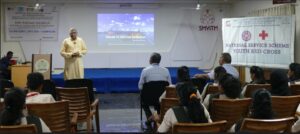 As a part of Azadi ka Amrit Mahotsav, NSS-YRC Unit and Eco Club of Shri Madhwa Vadiraja Institute of Technology and Management Bantakal in association with Ministry of Earth Sciences, Govt. of India, Vigyan Prasar, New Delhi, Karnataka Science and Technology Academy (KSTA), Bengaluru, Pilikula Regional Science Centre, Mangaluru organized an invited talk on “Issues in Marine Pollution” under the theme “Clean Coastal-Safe Sea” campaign on Friday, 02 September 2022 in the institute premises. Dr. Belle Damodar Shenoy, Principal Scientist, CSIR-National Institute of Oceanography, Vishakhapatnam was the resource person.
As a part of Azadi ka Amrit Mahotsav, NSS-YRC Unit and Eco Club of Shri Madhwa Vadiraja Institute of Technology and Management Bantakal in association with Ministry of Earth Sciences, Govt. of India, Vigyan Prasar, New Delhi, Karnataka Science and Technology Academy (KSTA), Bengaluru, Pilikula Regional Science Centre, Mangaluru organized an invited talk on “Issues in Marine Pollution” under the theme “Clean Coastal-Safe Sea” campaign on Friday, 02 September 2022 in the institute premises. Dr. Belle Damodar Shenoy, Principal Scientist, CSIR-National Institute of Oceanography, Vishakhapatnam was the resource person.
Dr. Damodar Shenoy started his presentation by briefing common types of pollutions which occurs in ocean like oil pollution and others which is marine debris which include various plastic items like shopping bags and beverage bottles, along with cigarette butts, bottle caps, food wrappers, and fishing gear. He said that marine pollution is a combination of chemicals and trash, most of which comes from land sources and is washed or blown into the ocean and this pollution results in damage to the environment, to the health of all organisms, and inturn to economic structures worldwide.
In his presentation, Dr. Shenoy explained the students that Chemical contamination, or nutrient pollution, is concerning for health, environmental, and economic reasons. This type of pollution occurs when human activities, notably the use of fertilizer on farms, lead to the runoff of chemicals into waterways that ultimately flow into the ocean. Marine trash encompasses all manufactured products—most of them plastic—that end up in the ocean. Littering, storm winds, and poor waste management all contribute to the accumulation of this debris, 80 percent of which comes from sources on land.
Plastic waste is particularly problematic as a pollutant because it is so long-lasting. Plastic items can take hundreds of years to decompose. Micro plastics are plastic pieces less than 5mm in size, that are more harmful than large plastic debris. The world’s oceans contain large amount of these particles, and their presence is severely affecting marine organisms. Dr. Shenoy also gave the solutions to marine pollution which includes prevention and cleanup.
Vice Principal, Dr. Ganesh Aithal, Dean, HODs of various departments, Faculty and Staff were present during the program. Mr.Nagaraja Rao, Coordinator NSS-YRC-RC Unit conducted the program. Ms. Supritha off first year CSE welcomed the gathering and compeered the program; More than 200 students were participated in the talk.